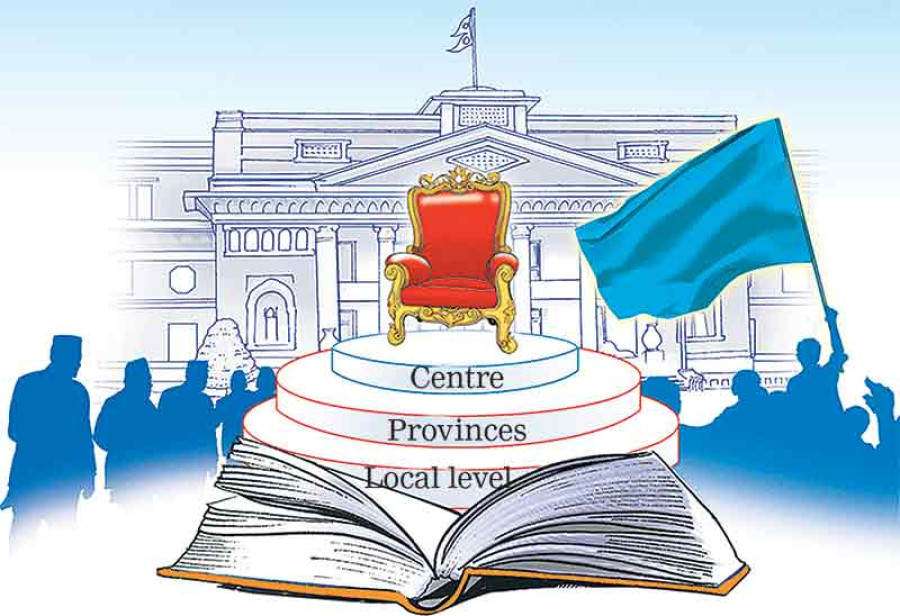National
Strengthening constitutionalism strengthens democracy, analysts say
Experts stress wider discourse on constitutionalism amid incidents in which those tasked with implementing the constitution have been brazenly trampling upon it.
Binod Ghimire
Amid tensions in Karnali Province after a group of provincial members moved a no-confidence motion against Chief Minister Mahendra Bahadur Shahi, the Nepal Communist Party central leadership intervened, instructing leaders to settle the dispute.
Prime Minister and party chair KP Sharma Oli then made a statement that provinces are “administrative units” under the federal government. This was the second time Oli made such a reference to provincial governments.
Oli’s statement quickly raised questions if he is still discarding federalism, which was guaranteed by the constitution adopted in 2015.
Nepal’s constitution that declared Nepal a democratic federal republic turned five last month. Observers, however, say over the years, many of the key agencies, most notably the federal government, and political leaders in Kathmandu have taken so many actions that undermine the spirit of the constitution. According to them, the fundamental problem is Nepali leaders who drafted the constitution themselves have failed to comprehend what constitutionalism means.
Experts on constitutional and political affairs say sovereignty vested in the people, limited government, the principle of separation of powers, independent judiciary, human rights and fundamental rights and inclusive governance system are the components of constitutionalism. The breach of any of these components means an attack on constitutionalism.
Vijay Kant Karna, a professor of political science at Tribhuvan University, said the very concept of constitutionalism is strengthening the institutions and prioritising institutional governance.
“I see a huge gap between the constitutional order and political process,” Karna told the Post. “The major concern is Oli, who was never for federalism, has been given the task of implementing the constitution. How can we expect constitutionalism to strengthen under him.”
According to Britannica, constitutionalism refers to efforts to prevent arbitrary government. At its most generic level, arbitrariness consists in the capacity of rulers to govern willfully—that is, with complete discretion—and to serve their own interests rather than those of the ruled, the encyclopedia defines. Constitutionalism attempts to avoid these dangers by designing mechanisms that determine who can rule, how, and for what purposes. But how?
That’s where the principle of separation of powers is quite important, say experts.
Nepal’s constitution provides for checks and balances by dividing the government into three parts—the executive, the legislative and the judiciary.
According to senior advocate Surendra Bhandari, any of the branches overriding another results in a breach of the principle of separation of powers, thereby crushing the very idea of constitutionalism.
Oftentimes, says Bhandari, the judiciary appears to be taking a position not to antagonise the executive. “This is because meritocracy has often been compromised while picking judges and justices,” Bhandari told the Post. “We can’t expect constitutionalism to become strong when the judiciary is weak.”
According to him, democratic principles, federalism, republicanism, secularism and inclusion—the pillars of the constitution—have come under attack in several instances.
“There seems to be a lack of understanding about constitutionalism,” said Bhandari.
Raju Prasad Chapagain, chairperson of the Constitutional Lawyers’ Forum, said in the simplest form, constitutionalism is adherence to a constitutional system of government.
Actions of the executive, the legislative function of parliament, the judiciary’s role and constitutional bodies’ constant watch to ensure proper checks and balances as well as media and civil society’s call for accountability are necessary to strengthen constitutionalism, according to him.
“However, except the media and civil society, to some extent, no other agency has performed their expected roles, thereby weakening constitutionalism,” said Chapagain.
Experts say public frustration will grow if the state machinery fails to function effectively and independently which will ultimately increase distrust in the constitution.
The present constitution is the seventh introduced in a span of as many decades in Nepal.
“Strengthening constitutionalism is necessary to ensure that the present constitution lasts long and becomes more effective,” said Chapagain.




 11.12°C Kathmandu
11.12°C Kathmandu














